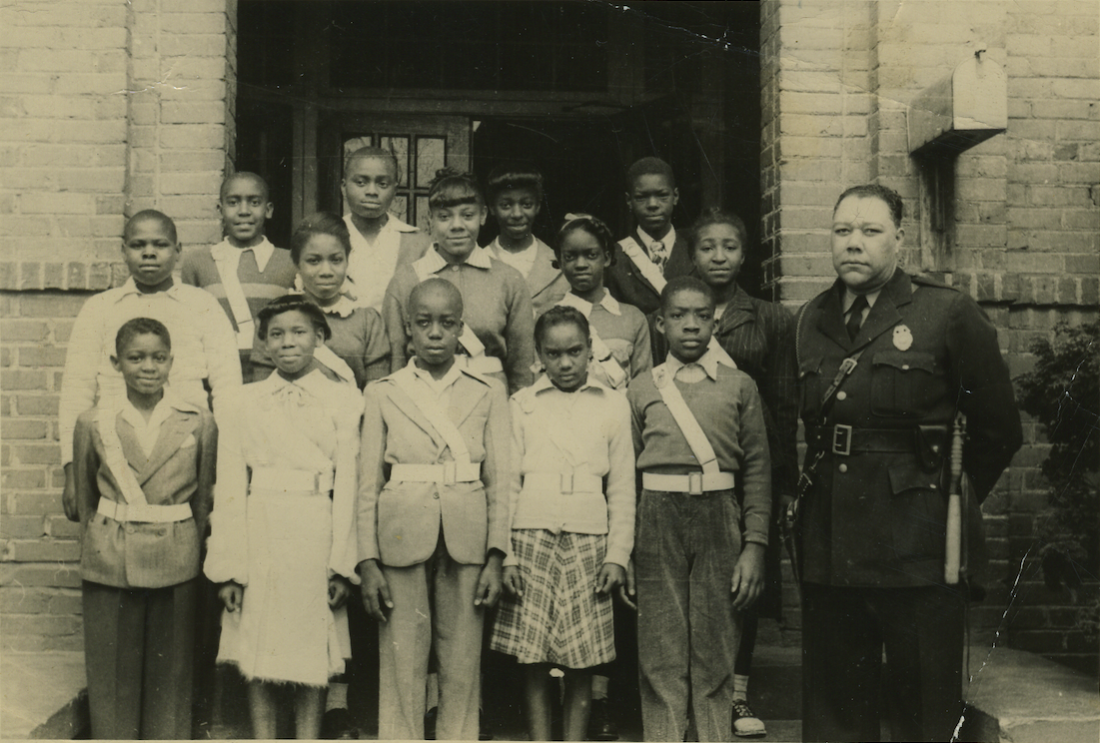On Sept. 13, 1945, a group of citizens led by Eugene Smith, publisher of Asheville’s Black-owned newspaper The Southern News, addressed City Council. In the following day’s issue of The Asheville Citizen, the paper reported that Smith had proposed to the council “that the city of Asheville employ Negro policemen for the policing of the Negro section[.]” (The Southern News may have also reported on the event, but unfortunately, digital copies of the publication are not readily available online.)
Smith went on to point out to Council that “26 cities in the South and practically every city in North Carolina have tried out the plan with conspicuous success,” the paper wrote.
Mayor L. Lyons Lee informed Smith and his delegation that Council would take the matter under consideration.
Five months later, on Feb. 4, 1946, Chief of Police Charles W. Dermid announced the city’s plan to hire its first two Black officers: DeLaney A. Horne and Gilbert Sligh. In the following day’s paper, The Asheville Citizen reported that Horne currently worked as a teacher and coach in the city school system; meanwhile, Sligh was employed by the Publix-Bamford theaters.
“A recent report from the North Carolina League of municipalities shows that Negro policemen are being used with good results in Charlotte, which has 6; Greensboro, which has 4; High Point, which has two,” the article continued.
Interest in the topic continued in the Feb. 6, 1946, edition of The Asheville Citizen. An editorial deemed it “a mature judgment,” on the part of city leaders and contended “that this decision will meet with wholehearted community approval.” Furthermore, the paper emphasized the shared role that both Black and white residents played in proposing the new hires.
“The innovation should make for greater efficiency in law enforcement and for better cooperation between the races,” the editorial concluded. “Respect for law and order suffers collectively when in any single instance it deteriorates or is ignored. The City administration has made a wise move which is certain to yield permanent gain.”
Horne and Sligh officially donned their new uniforms on April 4, 1946.
Subsequent headlines over the new hires soon receded from print. Both men were occasionally noted for their involvement in arrests.
Of the two officers, Horne’s time with the force is less clear. Sligh, however, retired from the Asheville Police Department on Nov. 24, 1962, due to a back injury sustained on the job and other health-related issues.
In addition to his time with the police, Sligh was a World War II veteran who served as a corporal in the Army. He died May 5, 1972, from a heart attack at Oteen Hospital (today’s Charles George VA Medical Center). He was 60 years old. In his obituary, The Asheville Citizen noted that Sligh had been “one of Asheville’s first two black policemen.”
Editor’s note: Peculiarities of spelling and punctuation are preserved from the original documents.



Back in February Joel Burgess of the Asheville Citizen-Times wrote a correction to the commonly understood “fact” of Dr. Reuben Dailey being Asheville’s first black elected official (Asheville City Council) in 1969. As it turns out, Newton Shepard was a black man elected to Asheville’s Board of Aldermen in 1892. One of Shepard’s achievements was to appoint a black man, Henry Saxton, to the 3-man police force.
Actually the first black cop in Asheville was Henry Saxton, appointed to the 3-man police department in 1892, the same year our first black elected official, Newton Shepard, served on the Asheville Board of Aldermen.
https://www.citizen-times.com/story/news/2021/02/26/black-history-month-who-ashevilles-first-black-council-member/4547027001/